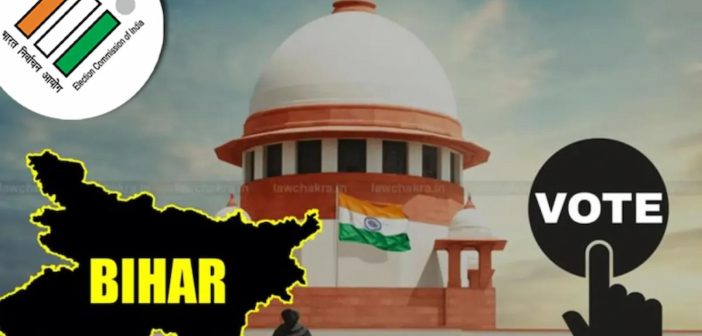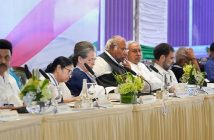In a significant twist to the Bihar voter list controversy, the Supreme Court has ordered the Election Commission to reveal details of 65 lakh deleted voters. This comes amid claims of unfair deletions ahead of Bihar’s assembly polls. Critics say it could tilt the vote. The Bihar SIR voter list controversy has sparked outrage. Parties accuse of bias. Voters fear losing their rights. The court demands transparency now. Will this restore trust in elections? The row highlights deep issues in India’s poll process. Stay tuned for complete details.
The Bihar SIR voter list controversy has gripped the nation. On August 14, 2025, the Supreme Court stepped in. It directed the Election Commission of India (ECI) to disclose the list of 65 lakh deleted voters from Bihar’s electoral rolls. This includes names and reasons for removal. The order aims to ensure fairness. It follows petitions challenging the Special Intensive Revision (SIR) process. Many call it the Bihar Sir Controversy. Allegations fly of mass disenfranchisement. This could affect millions. Bihar heads to the polls soon. The voter deletion case in Bihar raises questions about democracy. The court called SIR “voter-friendly” but stressed transparency. Families must know why names vanished. Compliance is due soon. This case tests electoral trust.
Background of the SIR Row
The SIR process stands for Special Intensive Revision. It updates voter lists in Bihar. The ECI launched it in June 2025. It ran till July 26. The goal was to clean the rolls. Remove duplicates and dead people. Verify identities with documents. But it turned controversial fast. Critics say it led to unfair deletions. Over 65 lakh names got struck off. That’s 8.31% of Bihar’s 7.89 crore voters. Petitioners claim no proper notice. Many voters learned late. The Bihar SIR voter list controversy started with wrong photos in the lists. Dead people stayed on rolls. Fake entries appeared, too. The ECI defended it as routine. But opposition parties cried foul. They said it targets specific groups. The row reached the Supreme Court in July. Hearings began this week. The court heard both sides.
Supreme Court’s Intervention
The Supreme Court order to the Election Commission came on Thursday. A bench led by Justice Surya Kant spoke. It included Justice Joymalya Bagchi. They said deletions must be public. Identify each person removed. Give clear reasons. Make it online for all. The court noted SIR is not anti-voter. But fairness is key. It can disenfranchise people. The ECI agreed to comply. It assured no deletions without notice. The court also allowed Aadhaar as ID proof. This helps those struck off. They can re-enrol easily. The Bihar SIR hearing in the Supreme Court focused on documents. In the 2003 revision, seven IDs were needed. Now it’s 11. This makes it voter-friendly, said the court. Electoral rolls can’t stay static. Updates are a must. But transparency rules.
Scale of Deletions
The deletions are massive. Sixty-five lakh voters gone. Bihar has 7.89 crore electors. This is over 8%. In a state of 13 crore people, it’s big. Many districts were hit hard. Rural areas suffer more. Urban too. Compare to past revisions. Regular summary revision deletes less. Here, it’s intensive. Door-to-door checks happened. Booth officers verified. But errors crept in. Untraceable voters topped the list. Migrants lost names. Women and people experiencing poverty were affected the most. Stats show 65 lakh under scanner. If not fixed, turnout drops. Bihar’s voter base shrinks. This alarms parties. Close polls could swing.
Reasons for Deletions
The ECI cited many reasons. Duplicates in lists. Dead voters not removed. Fake addresses found. No valid ID proof. Migrants untraceable. Wrong photos matched. Some shifted homes. No update done. Legal norms guide this. Representation of the People Act applies. Section 22 allows deletions. But with notice. Hearing must happen. ECI says it followed the rules. Booth-level officers checked. Forms issued for claims. But petitioners disagree. They say no fair chance. Mass deletions without proof. ECI is not bound to disclose, it argued first. But the court overruled. Reasons must be specific. Not vague. This ensures no bias.
Impact on Upcoming Elections
The upcoming elections in bihar 2025 face significant changes. Assembly polls due in 2025. Voter list updates key. The Bihar election voter list updates could hurt turnout. Deleted voters may skip polls. Trust erodes. Parties worry. Opposition says it favours the ruling side. BJP allies defend ECI. Close seats at risk. Bihar has 243 assembly seats. Margins often thin. Low turnout helps some. High hurts others. 2025 bihar general election might see protests. Re-enrollment drives start. But time is short. Outcomes unpredictable. Fair polls are in doubt.
Political Reactions
Political reactions to SIR are sharp. RJD leader Tejashwi Yadav slammed ECI. He called it the BJP’s tool. “Mass deletions target poor,” he said. Congress joined in. They alleged fraud. DMK from Tamil Nadu condemned it. Said ECI undermines polls. BJP hit back. Leaders called the claims baseless. “SIR cleans rolls,” they said. Nitish Kumar’s JD(U) supported ECI. “Needed for fair vote,” a leader noted. Rahul Gandhi’s past claims echoed. Though not Bihar-specific. Parties demand a probe. Accusations of bias fly. Support for the court order grows.
Legal & Constitutional Implications
The case ties to voter rights. Article 326 ensures adult suffrage. Deletions can’t be arbitrary. Transparency is a must. The Constitution safeguards polls. ECI must be neutral. Petitioners cite statutory rights. Voters stay on the rolls unless proven otherwise. No mass shifts allowed. The court upheld ECI’s powers. But with checks. Residual authority exists. Yet, fairness first. This sets a precedent. Future revisions will be stricter. Electoral trust boosts. If ignored, suits rise.
Next Steps & Deadlines
The Supreme Court of India, in a significant interim order on August 14, 2025, directed the Election Commission of India (ECI) to enhance transparency in the Special Intensive Revision (SIR) of Bihar’s electoral roll by publishing a detailed list of approximately 65 lakh voters excluded from the draft electoral roll published on August 1, 2025. The court, presided over by Justices Surya Kant and Joymalya Bagchi, mandated that the ECI upload this list, including reasons for exclusion such as death, migration, or duplication, on the websites of District Electoral Officers and the Bihar Chief Electoral Officer by 5 p.m. on August 19, 2025.
Public Response On Deletion of Voters
The Supreme Court’s directive has sparked varied reactions. Opposition parties, including the Rashtriya Janata Dal (RJD), Congress, and others, along with NGOs like the Association for Democratic Reforms (ADR), have welcomed the order, viewing it as a step toward ensuring transparency and protecting voter rights. These groups had challenged the ECI’s June 24, 2025, decision to conduct the SIR, alleging that the deletion of 65 lakh voters risked disenfranchising eligible citizens, particularly from marginalized communities. Posts on X reflect public sentiment, with users like @MahuaMoitra and @Nher_who praising the court’s push for accountability, emphasizing that public pressure through protests and press conferences contributed to this outcome.
Wider perspective, interconnected insights revealed
The Bihar SIR controversy arises ahead of the state’s assembly elections, expected in November 2025, making the electoral roll revision a critical issue. The ECI’s draft roll, published on August 1, 2025, listed 7.24 crore voters but excluded 65 lakh names, citing reasons such as death (22.34 lakh), permanent migration (36.28 lakh), and duplicate entries (7.01 lakh). This large-scale deletion prompted concerns about potential voter suppression, especially given the timing of the SIR, which critics argue was hastily ordered.
Conclusion
The Supreme Court’s order marks a pivotal moment in the Bihar SIR row, addressing concerns about transparency and voter rights in the electoral roll revision process. By mandating the ECI to disclose the list of 65 lakh deleted voters with reasons and ensuring public access through digital and physical means, the court has reinforced the importance of accountability in democratic processes. The directive not only responds to allegations of potential disenfranchisement but also sets a precedent for rigorous oversight of electoral roll revisions. As the ECI complies with the August 19 deadline and the case progresses to its next hearing on August 22, the outcome will likely shape public trust in the electoral process and influence the fairness of the upcoming Bihar assembly elections.
Check your voter status today and ensure your voice counts in Bihar’s polls.




